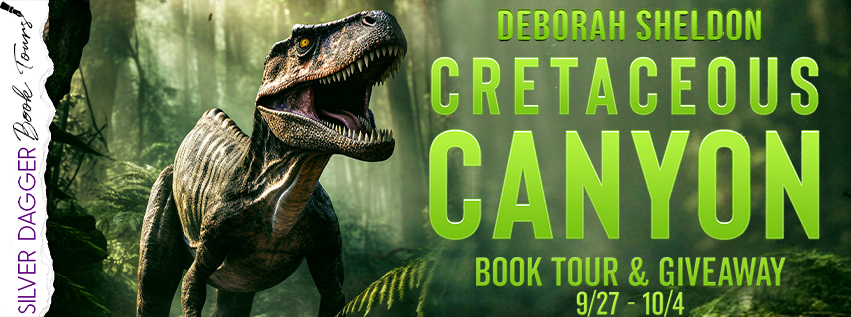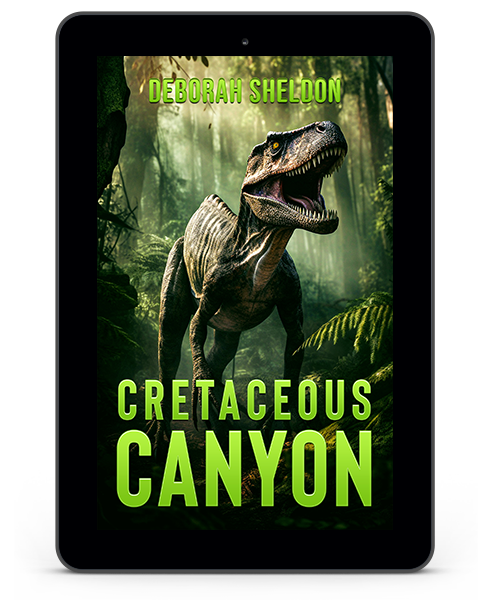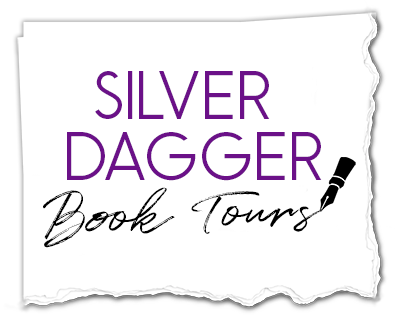A team on an expedition to explore a mysterious canyon in the Australian outback encounters Cretaceous-era dinosaurs.
Cretaceous Canyon
by Deborah Sheldon
Genre: Horror, Action, Adventure, Dinosaur Lost World
READER REVIEWS
Robyn O’Sullivan (Goodreads) 5/5 stars – This book is a gut-wrenching, roller-coaster ride through six hours of time, ripping the reader every which way through emotional and physical upheavals that suddenly crash-land, leaving a sense of “Wow! What the hell just happened?”.
Steve Paulsen (Goodreads) 5/5 stars – Unputdownable! A non-stop, page-turning, visceral, heart-pounding thriller. Highly recommended!
Cretaceous Canyon excerpt
by Deborah Sheldon
The hiss of the opening door drew everyone’s attention.
Good Christ! Alastair jumped to his feet.
It was Raj Devi himself, wandering into the conference room like a lost and befuddled grandfather, wearing slacks and a giant knitted cardigan. His hair and beard were salt-and-pepper, his seventy-two-year-old face frowning with its usual look of perpetual distraction.
Alastair raced towards the door and took its weight.
“Mr Devi!” he gasped, clumsily grasping his boss’s elbow. “What are you doing here?”
The old man glanced up, his gaze as sharp as darts, and whispered, “Rallying the troops.”
“Let me help you to a chair—”
“Thank you, I already know how to sit in a chair,” Raj said, and this time he lifted his voice, rolling it around the conference room, a deep and rich example of Received Pronunciation English, a baritone fit for the Shakespearean stage.
Alastair saw the effect on his recce team: everyone sat up straight. If he could figure out Raj Devi’s effortless ability to command an audience, then Alastair would rule the world.
“Everyone, pay attention,” Alastair said, his voice in comparison like a squeak to his own ears. “This is Raj Devi, your sponsor. You’re in the presence of a great man.”
Raj took Alastair’s chair and gazed around the table. No one rushed him. No one looked impatient. The silence was still and complete. He held them all in the palm of his hand, and Alastair both idolised Raj and hated him for this charisma, this absolute magnetism. Alastair had to remain standing, which was awkward, but the time for sitting was now lost.
With a half-smile, Raj nodded sagely. “I’m a believer in our power to make a better world,” he said, and the timbre of his voice sounded hypnotic; even Gloria was in thrall. “So, if you’ll indulge me, I’d like to tell you a story. A story about seeds. Leaves. Bark. Fruit. The human race has used plants to make medicines since before written language was invented. Traditional medicines date back thousands of years to Egyptian scrolls, Indian clay tablets, Chinese inscriptions etched on seashells and across the dried bones of oxen. Today, one in ten of our essential modern medicines is based on flowering plants. One in ten! My word.”
Lapsing into silence, Raj linked his fingers together on the table and closed his eyes. The seconds ticked on. Alastair checked the faces of his team and felt that he must say something, had to say something, or risk losing them. But what? God, the empty seconds kept ticking…
Alastair said, “Not just medicines! No, the plants we find today could also make new pesticides, and help farmers to breed disease-resistant crops—”
“All of us,” Raj Devi interrupted in his sonorous tone, “has taken a painkiller as simple as the aspirin. That miracle medicine was derived from the willow tree, its properties discovered by ancient Egyptians and other peoples such as Native Americans. Morphine is from the poppy. Today, plants help treat Parkinson’s Disease, diabetes, various cancers, heart disease, other ailments. Your work today could very well discover unknown plants that may herald a new age of medicine. Imagine, a cure for Alzheimer’s! It might be waiting for you, out there in that canyon. Waiting for all of us, the entire human race. Your hike has the potential to change the world, and save countless lives for generations to come. Oh, my goodness. What a legacy.”
The silence in the room was absolute. Alastair became aware that he was holding his breath. The team members appeared transfixed, mesmerised by the old man.
“Thank you,” Raj sighed. “Thank you for striving to help me make a better world.” He pushed out his chair, stood up, went to leave and then hesitated. “Please,” he added, “eat as much of the breakfast buffet as you can. It cost me a small fortune!”
He laughed and everyone joined in. Like Pavlov’s dogs to a bell, they automatically reached for Danish pastries, croissants, donuts, muffins, goat cheese tarts, fruit skewers.
Alastair stopped Raj at the door. The old man glanced up at him, cold and annoyed.
Taken aback, Alastair found himself stammering. “Gosh, sir, that was a…that was a…”
“What?”
“Such a terrific, inspiring speech—”
“I don’t take notes.”
“Oh, I didn’t mean—”
“Focus on the hike. Don’t fuck it up,” Raj said, and put his hand on the door.
“I’ve put together a competent team,” Alastair said, striving to appear confident. “I’m just wondering if you think it’s absolutely necessary that I go with them into the canyon.”
Raj gave a frosty smile. “Hmm. I don’t know. Do you think you’re necessary?”
“Well, yes, in the creation of the team—”
Raj raised his eyebrows. “And now that the team has been created?”
“Ha-ha! I’m sorry, I’m not sure—”
“You’re not sure if you’re necessary anymore?”
Sweat beaded on Alastair’s hairline. “No. I mean, yes. I’m still necessary, sir.”
“Okay.” Raj patted him on the arm. “Enjoy your hike.”
“Yes, sir.”
Raj left the room. Alastair watched him shuffle along the hallway towards the bank of lifts, where he would take a ride to the building’s top floor and probably take a fucking nap. Raj Devi walked like an old man in his seventies, which is what he was, and his refusal to put on a false front was admirable in a way that stuck in Alastair’s craw. Only a multi-millionaire could afford to drop the façade, wear slacks with a baggy cardigan, let his paunch hang out.
How long does it take to write a story?
My fiction has been published since 2005. Back then, I had a rule of thumb: to write 2500 words of a publishable standard per week. That rule served me well. I could write a short story inside two weeks; a novella inside four months; a novel inside nine. A lot of my work was published, which encouraged me to keep going.
Over the years, as I became more proficient at my craft, my numbers got better. These days, I can write a short story within three days. My latest novel, the action-packed thriller, Cretaceous Canyon, took five months.
But it all depends on the story. Regardless of the length – whether flash, short story, novella or novel – some stories pant to be written, and flow from your fingertips at the speed of light. Other stories are more thoughtful, requiring you to slow down, taste and sample, contemplate.
I’ve taught writing, on and off, since 2010. For the last seven years, I’ve been a mentor in the Australasian Horror Writers Association’s Mentorship Program, where beginners are matched with experienced writers to help improve their craft. With each mentee, despite the different challenges and issues they have, at some point I give them the same advice: how long it takes to write a story = how long is a piece of string. Go as fast as your passion allows. Don’t be afraid to meander. Equally, don’t be afraid to race. Like a horse, give your story its head.
Writing is a dynamic, individual experience that is impossible to pin down. If the words are flowing and you’re happy with them, that’s great. If you’re stuck, consider that you’re coming at the story from the wrong perspective. Remember, if you want help or advice from industry professionals, for any reason, seek it out.
DEBORAH SHELDON is an award-winning author from Melbourne, Australia. She writes short stories, novellas and novels across the darker spectrum of horror, crime and noir. Her award-nominated titles include the novels Body Farm Z, Contrition and Devil Dragon; the novella Thylacines; and the collections Figments and Fragments: Dark Stories and Liminal Spaces: Horror Stories.
Her collection Perfect Little Stitches and Other Stories won the Australian Shadows ‘Best Collected Work’ Award, was shortlisted for an Aurealis Award and longlisted for a Bram Stoker. Deb’s short fiction has appeared in many well-respected magazines such as Aurealis, Midnight Echo, Andromeda Spaceways, and Dimension6, been translated, shortlisted for numerous Australian Shadows Awards and Aurealis Awards, and included in various ‘best of’ anthologies such as Year’s Best Hardcore Horror.
She has won the Australian Shadows ‘Best Edited Work’ Award twice: for Midnight Echo 14 and for the anthology she conceived and edited, Spawn: Weird Horror Tales About Pregnancy, Birth and Babies.
Deb’s other credits include TV scripts such as NEIGHBOURS, feature articles, non-fiction books (Reed Books, Random House), stage plays, poetry and award-winning medical writing.
Follow the tour HERE for special content and a giveaway!
$10 Amazon








No comments:
Post a Comment
I try to get comments published as quickly as possible. I don't always reply to comments on my blog, but I do try to visit as many people as possible when I participate in blog hops and I share links where possible to Twitter, Facebook, Pinterest, and such so others can discover your work. I do read and appreciate your comments.